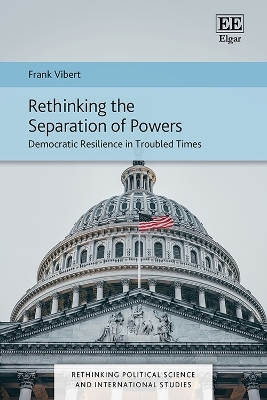
Rethinking the Separation of Powers
Democratic Resilience in Troubled Times
Seiten
2024
Edward Elgar Publishing Ltd (Verlag)
978-1-0353-1579-6 (ISBN)
Edward Elgar Publishing Ltd (Verlag)
978-1-0353-1579-6 (ISBN)
Exploring the evolution and resilience of systems for the separation of powers, this prescient book rethinks how different architectures can defend democracies against adverse shocks and help them adapt to change. Frank Vibert cuts across many fields of study to address the central problem in modern government of how to balance the reasoning of experts with that of electoral politics.
Beginning from the original separation of powers between the legislative, executive and judicial branches of government, Vibert explores modern alternatives to this system. In particular, he discusses consociationalism, based on the need for political consensus for major decisions, as well as rights-based approaches. Looking to the future, he identifies important areas for improvement in these systems, such as better defences against corruption and stronger representation for the marginalised as well as the need to address income and wealth differences. Ultimately, he shows that the separation of powers is a learning system that can adapt to the tasks of modern government, especially by combining the reasoning of experts with political strategy without reverting to technocracy.
Rethinking the Separation of Powers is an essential read for students and scholars of political science, law, behavioural science, social psychology and philosophy. Addressing central problems in modern government, it will also be vital for researchers interested in strategies for effective policy-making.
Beginning from the original separation of powers between the legislative, executive and judicial branches of government, Vibert explores modern alternatives to this system. In particular, he discusses consociationalism, based on the need for political consensus for major decisions, as well as rights-based approaches. Looking to the future, he identifies important areas for improvement in these systems, such as better defences against corruption and stronger representation for the marginalised as well as the need to address income and wealth differences. Ultimately, he shows that the separation of powers is a learning system that can adapt to the tasks of modern government, especially by combining the reasoning of experts with political strategy without reverting to technocracy.
Rethinking the Separation of Powers is an essential read for students and scholars of political science, law, behavioural science, social psychology and philosophy. Addressing central problems in modern government, it will also be vital for researchers interested in strategies for effective policy-making.
Frank Vibert, Associate, Centre for the Analysis of Risk and Regulation (CARR), London School of Economics, UK
Contents
Preface
Introduction: the architectures for democratic choice
1 The classic concept: an architecture for learning
2 What has changed: the contemporary setting for the
separation of powers
3 Alternatives: consociationalism and accommodation
4 Alternatives: rights-based directional architecture
5 The separation of powers and the architecture of learning
6 Challenges: approaches to updating
7 The separation of powers compared: resilience
8 The continuing importance of a democratic architecture
for learning
References
| Erscheinungsdatum | 22.08.2024 |
|---|---|
| Reihe/Serie | Rethinking Political Science and International Studies series |
| Verlagsort | Cheltenham |
| Sprache | englisch |
| Maße | 156 x 234 mm |
| Themenwelt | Sozialwissenschaften ► Politik / Verwaltung ► Politische Systeme |
| Sozialwissenschaften ► Politik / Verwaltung ► Staat / Verwaltung | |
| ISBN-10 | 1-0353-1579-3 / 1035315793 |
| ISBN-13 | 978-1-0353-1579-6 / 9781035315796 |
| Zustand | Neuware |
| Informationen gemäß Produktsicherheitsverordnung (GPSR) | |
| Haben Sie eine Frage zum Produkt? |
Mehr entdecken
aus dem Bereich
aus dem Bereich
wie ich versuchte, Italienerin zu werden
Buch | Hardcover (2024)
Droemer (Verlag)
CHF 35,90


